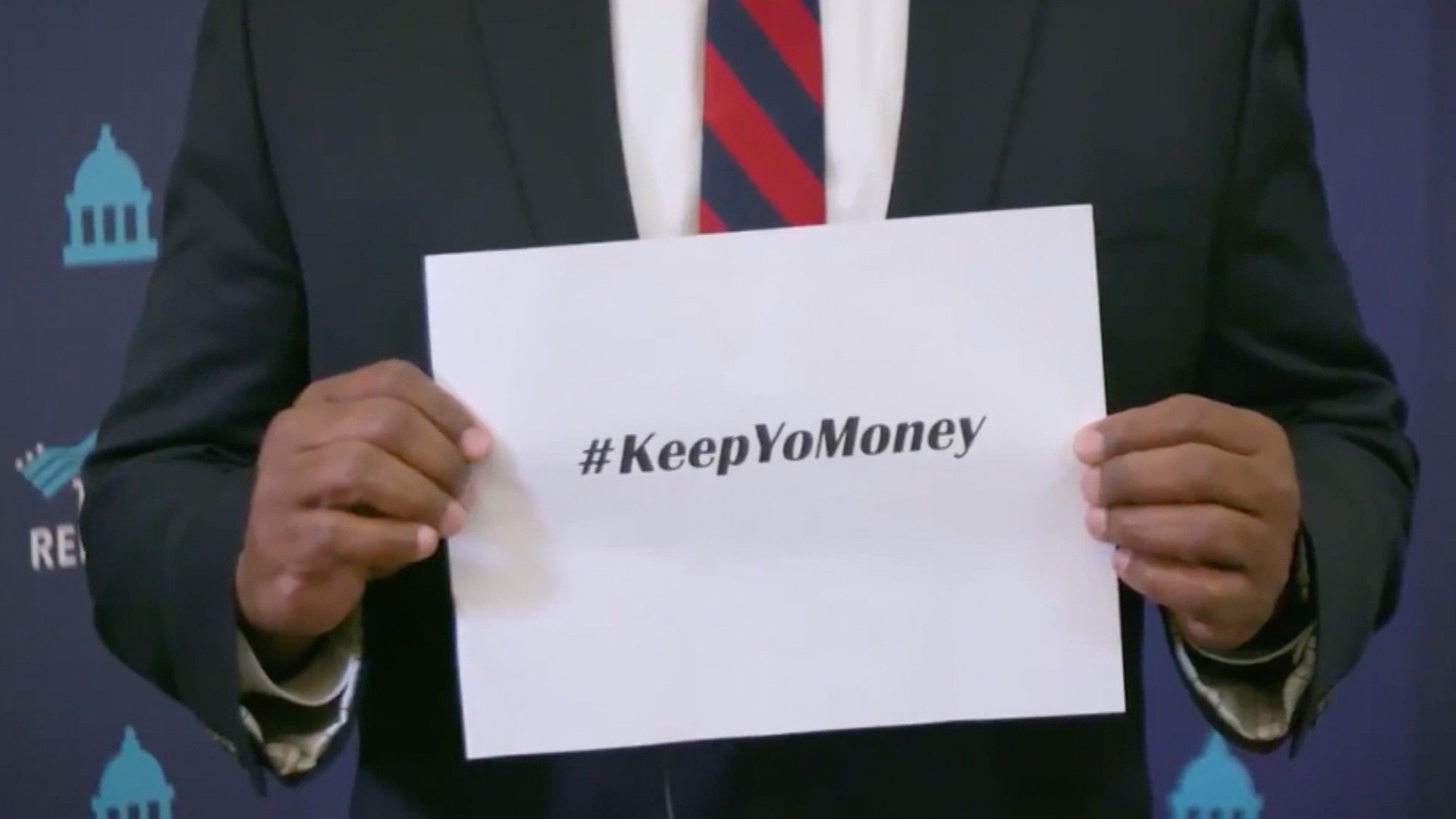Donald Trump’s public persona has long been of a man infatuated with money. He has prodigiously nurtured this image over decades by building tall towers, making grand purchases and socializing with Manhattan’s moneyed elite. It’s no wonder, then, that despite Trump’s potent campaign attacks on America’s bankers, investors and oligarchs, he filled his White House with former Wall Street executives. Many of the president’s proposals -- from his tax plan to various executive orders -- fulfill longstanding desires of the well-heeled.
Advertisement
“Trump’s promises were obviously all fake,” said Barney Frank, a former House Democrat who led the passage of lofty financial reforms in the wake of the 2008 subprime mortgage crisis. “Nothing in his background suggested that he would crack down on the banks. It was all bullshit.”In just ten months, Trump has installed industry-friendly figures at the helm of two major federal financial regulatory agencies – the Securities and Exchange Commission and the Office of the Comptroller of the Currency. Trump’s Commerce Secretary is a shrewd investment banker by trade and his Director of the National Economic Council used to preside over Goldman Sachs.Trump will soon get the chance to replace additional Obama-era officials at various other important financial regulatory agencies, including the Federal Reserve, the Federal Deposit Insurance Corporation (FDIC) and the Consumer Financial Protection Bureau (CFPB). According to The Intercept, the CFPB is particularly reviled among Wall Street power players for its aggressive actions, which has included $11 billion in fines levied against top financial institutions.
The CFPB’s well-respected first director, Richard Cordray, announced last week that he would be stepping down from his post by the end of the month. This leaves Trump with an incredibly important seat to fill. The White House has signaled that Trump will replace Cordray with Mick Mulvaney, the current Director of the Office of Management and Budget.“Trump’s promises were obviously all fake.”
Advertisement
Mulvaney raked in more than $1.2 million in donations from the financial sector in his six years in Congress, according to the Center For Responsive Politics. Perhaps grateful for Wall Street’s generous gifts, Mulvaney worked as a legislator to suppress CFPB’s public complaint data against major financial institutions. His 2016 legislation – H.R. 5491 – would prevent the public release of complaint data unless the CFPB could verify “the accuracy of all facts alleged in such complaint,” a virtually impossible task for a database of more than one million entries.
Check out more videos from VICE:
One of Mulvaney’s top Congressional donors was the American Bankers Association (ABA), a hugely powerful lobbying force whose policy dreams have infected Washington’s hive mind.The group has challenged various CFPB rules in court, including the landmark arbitration rule, which aimed to make it easier for consumers to file class-action lawsuits against financial service providers, like banks or credit card companies. Despite bipartisan support, the arbitration rule was overturned by Congressional Republicans in October.“Wall Street won and ordinary people lost,” Cordray said after Vice President Mike Pence cast the tie-breaking vote to scrap the arbitration rule, which was carefully crafted by Cordray and his staff over six years.Working in a friendly political environment, the ABA is now feverishly lobbying to overturn other Wall Street regulations passed in Frank’s landmark law, which is formally called the Dodd-Frank Wall Street Reform and Consumer Protection Act.
Check out more videos from VICE:

One of Mulvaney’s top Congressional donors was the American Bankers Association (ABA), a hugely powerful lobbying force whose policy dreams have infected Washington’s hive mind.The group has challenged various CFPB rules in court, including the landmark arbitration rule, which aimed to make it easier for consumers to file class-action lawsuits against financial service providers, like banks or credit card companies. Despite bipartisan support, the arbitration rule was overturned by Congressional Republicans in October.“Wall Street won and ordinary people lost,” Cordray said after Vice President Mike Pence cast the tie-breaking vote to scrap the arbitration rule, which was carefully crafted by Cordray and his staff over six years.Working in a friendly political environment, the ABA is now feverishly lobbying to overturn other Wall Street regulations passed in Frank’s landmark law, which is formally called the Dodd-Frank Wall Street Reform and Consumer Protection Act.
Advertisement
During the group’s annual conference in October, Rob Nichols, president and CEO of ABA, could barely hide his glee at the Trump administration’s bank-friendly approach to policymaking.“For the first time in a long time, regulators and lawmakers in Washington are looking seriously at sensible changes that could allow banks to do even more for their customers and their communities,” Nichols proclaimed.This year, ABA has lobbied on all sorts of measures, both big and small. Federal lobbying disclosures don’t indicate whether an entity lobbied for or against a piece of legislation, and an ABA spokesperson declined to answer questions regarding specific bills.
But ABA’s work is generally focused on two types of legislation: muscular bills that increase scrutiny over the financial industry or proposals that strip regulations and requirements imposed after the 2008 financial crash. The trade group has some more than $8 million on lobbying this year alone.The bills ABA has recently dedicated lobbying manpower to include the Financial Choice Act, which passed the House in June. The Choice Act, if signed into law, would gut major reforms passed in Dodd-Frank, freeing banks of regulatory requirements and annual stress tests. ABA has also lobbied to reform the Volcker and Fiduciary rules – two important consumer protections passed in recent years.The trade group has also worked on The Tailor Act, which essentially requires federal financial regulatory agencies “tailor any regulatory actions so as to limit burdens on the institutions involved.” The bill, which would be retroactively applied to every financial reform of the past seven years, would give the fox input over how to guard the hen house.“Wall Street won and ordinary people lost.”
Advertisement
The lead sponsor of the Tailor Act, Republican Tipton Scott of Colorado, was not made available for an interview.Another bill ABA lobbied on is one diametrically opposed by the banks: the Subsidy Reserve Act. The bill, introduced by U.S. Rep. Michael Capuano, D-Ma., would require the seven largest financial institutions to maintain higher levels of capital so that, in the case of an equity or debt crisis, the company could save itself, instead of leaning on the federal government for a bailout.
Capuano, a veteran member of the House Financial Services Committee, helped draft Dodd-Frank, and sees a dangerous empowerment of financial institutions under Trump.“Banks are not willing partners, just the opposite,” Capuano said. “We are trying to make their lives a bit more difficult, not kill them. But let’s be honest, they almost took the world’s economy down. If you want to play monopoly with your money, that’s fine. But then you should be required to have more capital reserves.”While Wall Street has already notched a number of wins, Frank believes his landmark law won’t be gutted entirely. He pointed out that many post-crash reforms are popular with Americans of all political persuasions, and that Republicans won’t dare repeal them. He also said there were also fail-safe provisions put into Dodd-Frank, including one that insulates the CFPB from Congressional budget cuts.“Banks are not willing partners, just the opposite.”
Advertisement
Other current legislators aren't quite as optimistic. Sen. Elizabeth Warren, D-Ma., has been expressing grave concerns over Trump’s financial deregulatory agenda, and she recently wrote that Mulvaney’s appointment would be “a giant middle finger to consumers.” In a recent op-ed for the Los Angeles Times, U.S. Sen. Bernie Sanders, I-Vt., was similarly grim, saying Trump has “repeatedly reneged on his promises by supporting the interests of the wealthy and powerful at the expense of working families.”Capuano was just as blunt as his colleagues.“The system is much safer today than it was before the crash,” Capuano said. “But regulators are already starting to undermine the progress we’ve made. We are heading back to the wild west days of Wall Street.”Forty states are represented on the House Financial Services and Senate Banking Committees, which hold huge sway over future of financial regulations. Check to see if one of your representatives is on one of the committees, and let them know that you care about keeping Wall Street well regulated. If you have a home state senator on the Senate Banking Committee, they will soon hold confirmation hearings for a new CFPB director. Contact your representatives above, and let them know you want a director who isn’t in the pocket of powerful financial players.
